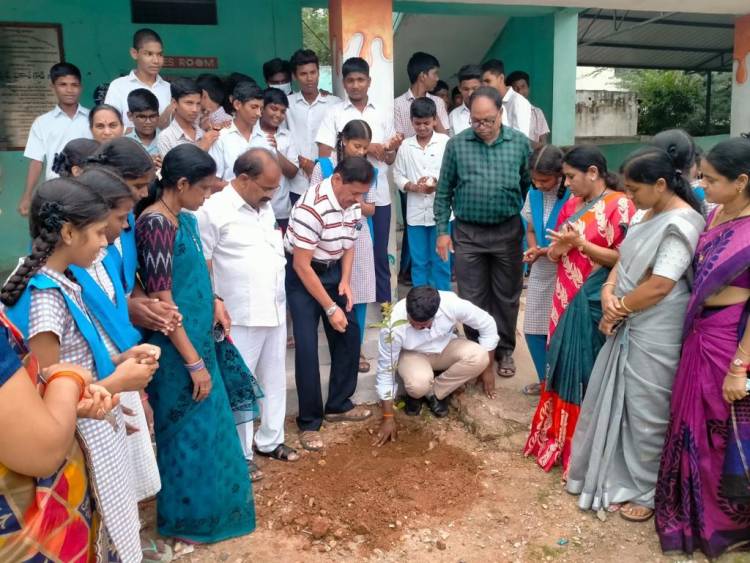[GHHF] Hindu Values to avoid Environmental Crisis – Taught to Government Junior College Students in Telangana
 Kapila Vatsayana
Kapila Vatsayana
“Man’s life depends upon and is conditioned by all that surrounds him and sustains him, namely, inanimate, mineral and animate, aquatic, animal and gaseous life. It is therefore, man’s duty to constantly reminded himself – in individual and collective life – of the environment and the ecology.”
Global Hindu Heritage Foundation (GHHF) in association with Nitya Satyam has been organizing Ghar Waapasi in the Telangana area. Lakshmi Nivas and his volunteers went to many villages and talked about the richness of our culture knowing that they became Christians not because of the message of the Bible but because of their financial circumstances, health-related issues, deceptive interpretation of Hindu scriptures and demeaning the multiplicity of Hindu Gods.
Protect Environment to prevent Human Crisis
“Ether, air, fire, water, earth, planets, all creatures, directions, trees and plants, rivers and seas, they are all organs of God’s body. Remembering this a devotee respects all species.” Srimad Bhagavatam (2.2.41),
As many are aware that United Nations started the program to protect environment bay making people aware of the potential danger to the globe in terms of high temperatures, pollution, cold whether, draught and food shortages. Many Ecologists such as Pankaj Jain, Christopher Chapple, Harold Coward, and others have written extensively about the Hindu values related to the preservation Panchabhutas.
Hindus revere sacred rivers, mountains, forests, trees, birds and animals,. Many live their lives very close to nature. For example, many Hindu villages have a sacred lake, protect the banks from erosion. The lake and its grove store rainfall to irrigate surrounding fields and supply village wells with drinking water.
Hinduism teaches that the Panchabhutas (five great elements) - space, air, fire, water and earth - that constitute the environment are all derived from prakriti, the primal energy. Each of these elements has its own life and form; together the elements are interconnected and interdependent.
In the Mahabharata, it is noted that the universe and every object in it has been created as an abode of the Supreme God meant for the benefit of all, implying that individual species should enjoy their role within a larger system, in relationship with other species.
In Hinduism, protecting the environment is an important expression of dharma.
The earth is called Mother and a goddess and our mother and treated it with respect. She deserves our devotion and protection for our own survival. In the early morning, many Hindus touch the floor before getting out of bed every morning and chant a sloka asking Mother earth to forgive them for trampling on her body.
The world population is steadily inching towards 8 billion, and we’re using the equivalent of 1.6 Earths to maintain our current way of life, the United Nations Environment Programme (UNEP) reported. Naturally, the ecosystems cannot keep up with our demands and, as a result, are fast declining.
We need to remember that we only have one Earth and are running out of time to save our planet. Which is why the theme for this year’s World Environment Day — only one Earth — fits the world situation perfectly.
It focuses on the need to live sustainably in harmony with nature, and our possibilities for shifting to a greener lifestyle through both policies and individual choices.
UN Environment Programme says, “We must shift from harming the planet to healing it. We must protect what we have & bring back what we lost to advance to a better, more sustainable future, where all species can thrive.”
Therefore, World Environment Day calls for “collective, transformative action on a global scale to celebrate, protect and restore our planet,” encouraging everyone, everywhere, to live sustainably and address the climate change.”
Hinduism and Environment
Christopher Framarin’s book “Hinduism and Environmental Ethics: Law, Literature, and Philosophy” breaks new ground in the field by being the first monograph to address the question of how Hindu philosophy can offer a coherent, systematic approach to environmental ethics. It presents careful, extensive, and original interpretations of passages from the Manusmrti (law), the Mahābhārata (literature), and the Yogasūtra (philosophy), and argues that these texts attribute direct moral standing to animals and plants for at least three reasons: they are sentient, they are alive, and they possess a range of other relevant attributes and abilities.
College Students and Planting Saplings
Our Pracharak Lakshmi Nivas went to a College in Mylaru Devalaplli and convinced the Principle, he spoke about the importance of Environment and should always obey the signs of environment by respecting the animals, protecting the trees, reducing the pollution. He requested the College students to appreciate and practice Hindu way of life which brings balance to the nature and living entities.
He requested college students to plant the saplings and also take care of these saplings to make sure they are grown to protect the nature.
WE NEED YOUR HELP
We appreciate it if you can help in hiring more people who can go to these villages to do Ghar Waapasi. We have employed 26 people so far. More people we hire, more villages can be covered to welcome them back and also create Chaitanya (Awareness) among the students and villagers.
1) Donate any amount to help the Dharma Pracharaks to work at the ground level.
2) Sponsor one Pracharak: In order to expand our base and hire one Pracharak, it would cost approximately $3000.00 - $3500.00 per year. We have five anonymous donors who sponsored 9 Pracharaks
DONATIONS
PayPal Method: To donate visit our website: savetemples.org. Click on the Donate button, then press the Purpose category, and select the General Donation category.
By Check: Or you can send a check payable to: GHHF, . It is tax-deductible.
By Zelle: ghhfusaorg@gmail.com
By Rupees, please contact us by either phone or email.
For more information, call Prakasarao V Velagapudi ; Email: ghhfusaorg@gmail.com





















 Urgent support needed for Bangladesh Hindus
Urgent support needed for Bangladesh Hindus 







